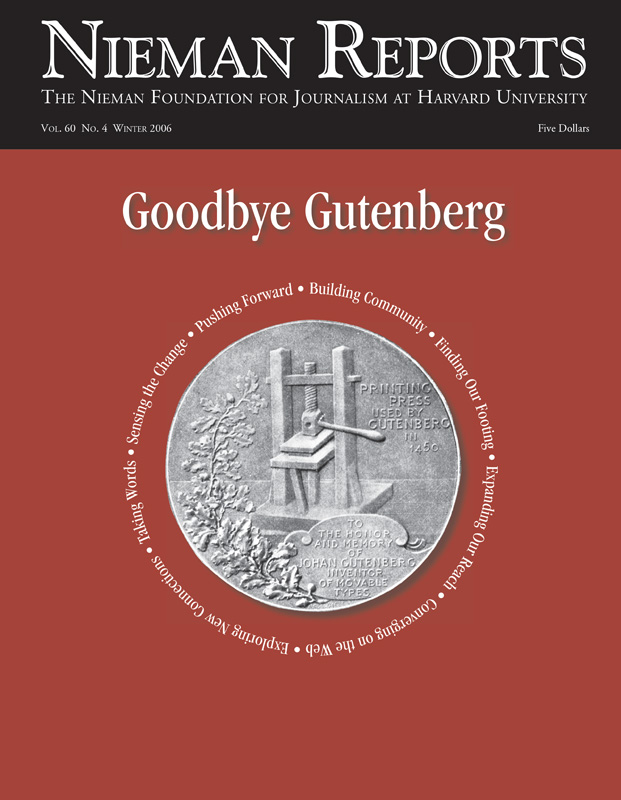On the Post Register’s Web site we spell out our newspaper’s code of ethics, thereby empowering those who want to examine our work. Of the many advantages of digital-enhanced journalism, this one arguably does the most to uphold and strengthen the important ethical traditions handed down through newsrooms for hundreds of years.
Few people actually use a printed ethics code. Most newsroom ethics booklets aren’t even up-to-date, and current ones often can’t be found on newsroom desks. Take it a step further into the homes of readers, and any reader who keeps a printed copy is either planning to sue the paper or needs insomnia medication.
But a paper’s ethics code—and examples of how it works—should be readily accessible to readers and staff. When journalists get something wrong, even a casual reader needs to know the ethics standards in detail. And RELATED WEB LINKS
Code of Ethics Enforcement Cases
– www.postregister.comwhen that reader contacts the newsroom, the reporters and editors need to be familiar with their ethics policy, as well.
With the code online, readers can click through from lofty principles like "Seek Truth" to specific standards of practice, such as prohibitions on the use of unnamed sources. They can find post-enforcement reports about when ethics standards were not upheld; these reports let readers (and staffers) understand that the code’s principles will be enforced. Newspapers print names of folks who are convicted, and even accused, of crimes, so journalists should not be exempt from public disclosure when they violate the paper’s standards.
Along with the code, there are disclosures of unavoidable conflicts of interest, such as the politically active spouse of the editor or a real estate investment by the person who covers the neighborhood. And there is an annotated version of a controversial story that helps readers to understand RELATED WEB LINKS
Disclosures Interactive Walk Through
– www.postregister.comwhy certain facts are left out of a story or how narrative journalism, while reading like fiction, still gets at the truth, or how certain assertions find their way into an article even without a specific source attached to them.
Even though the paper’s lawyer will quail and the union will gripe, arguments against doing this aren’t strong. Imagine being an editor who refuses to give readers a copy of the ethics code. Any lawyer will have a copy in the first round of discovery; ditto with the examples of enforcement. And posting this material online sends a powerful message to readers. But don’t expect much to happen when it first goes up. The citizenry will not storm the gates, even if attention is called to it by reprinting the ethics code in the paper with links scattered all over the page.
But when the newspaper prints—as ours did—the name of a minor who stole his father’s police car or includes the words "Stupid sonuvabitch!" in a story about a football game brawl, having the ethics code in front of both of us is a good place to start with callers. It’s a way to talk about the competing forces of seeking truth and minimizing harm and provides a way to describe how one newspaper’s code differs from others due to peculiarities of its community.
Ten minutes of give-and-take and only the most unreasonable critics will fail to notice the newspaper’s seriousness of purpose or realize it’s not as simple as they thought. And each conversation spreads the idea that a code of ethics is not some philosophical jujitsu manual by which any bad decision can be rationalized. Rather, readers learn your ethics, like theirs, are the starting point for searching conversations, the weighing of alternatives, and the honest treatment of what is known and not known.
Our Web site’s ethics section was built after a year and a half of spirited, sometimes acrimonious, debate—involving staff and readers—about decisions we made to publish the contents of (illegally) sealed court files and our refusal to identify a recovering family of methamphetamine addicts we’d profiled in harrowing detail.
When a newspaper does breach its code, a thoughtful correction, prominently published, will do as much good for the paper’s reputation as the item did it harm—if not more. For six months we’ve had this kind of ultratransparent newspaper ethics and discovered no downside. It offers readers ideas and phrases to use in their criticism of our journalism, which has a way of sorting serious critics from simple haters. Most importantly, it encourages meaningful dialogue that reconnects journalists to communities and to the high standards reflecting the civic obligations of the American press.
Dean Miller is executive editor of the Post Register in Idaho Falls, Idaho. In creating the Web pages, which were done as part of his public service project as a 2006-2007 Poynter Ethics Fellow, Miller relied on the newspaper’s Web designer, Aaron Avery.



